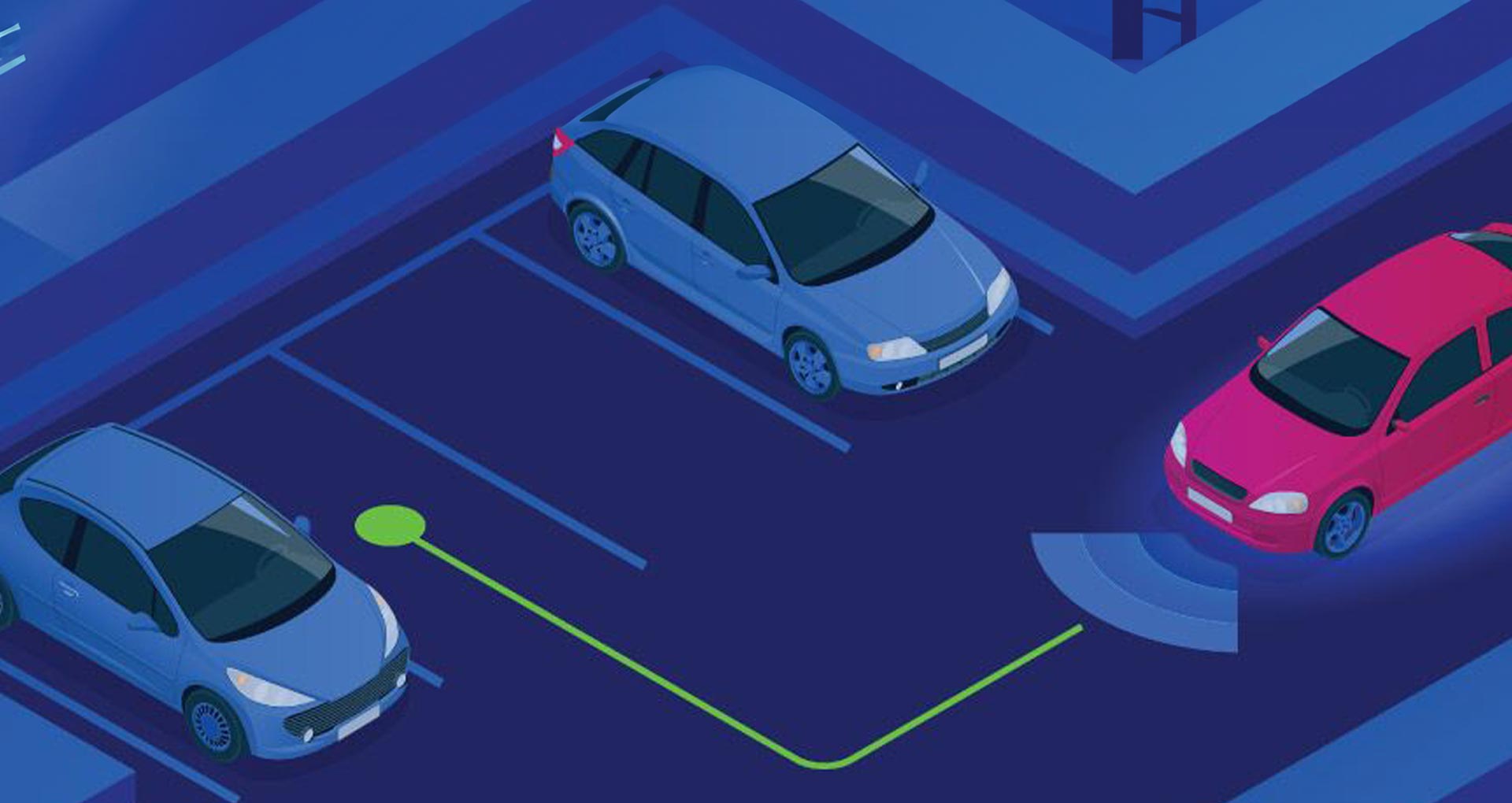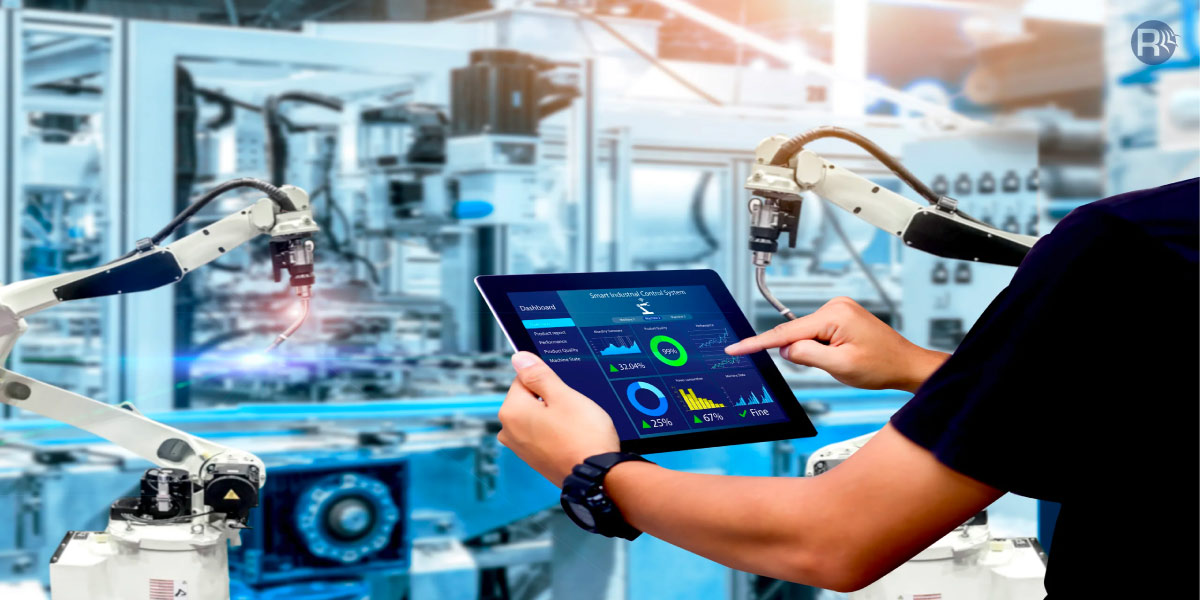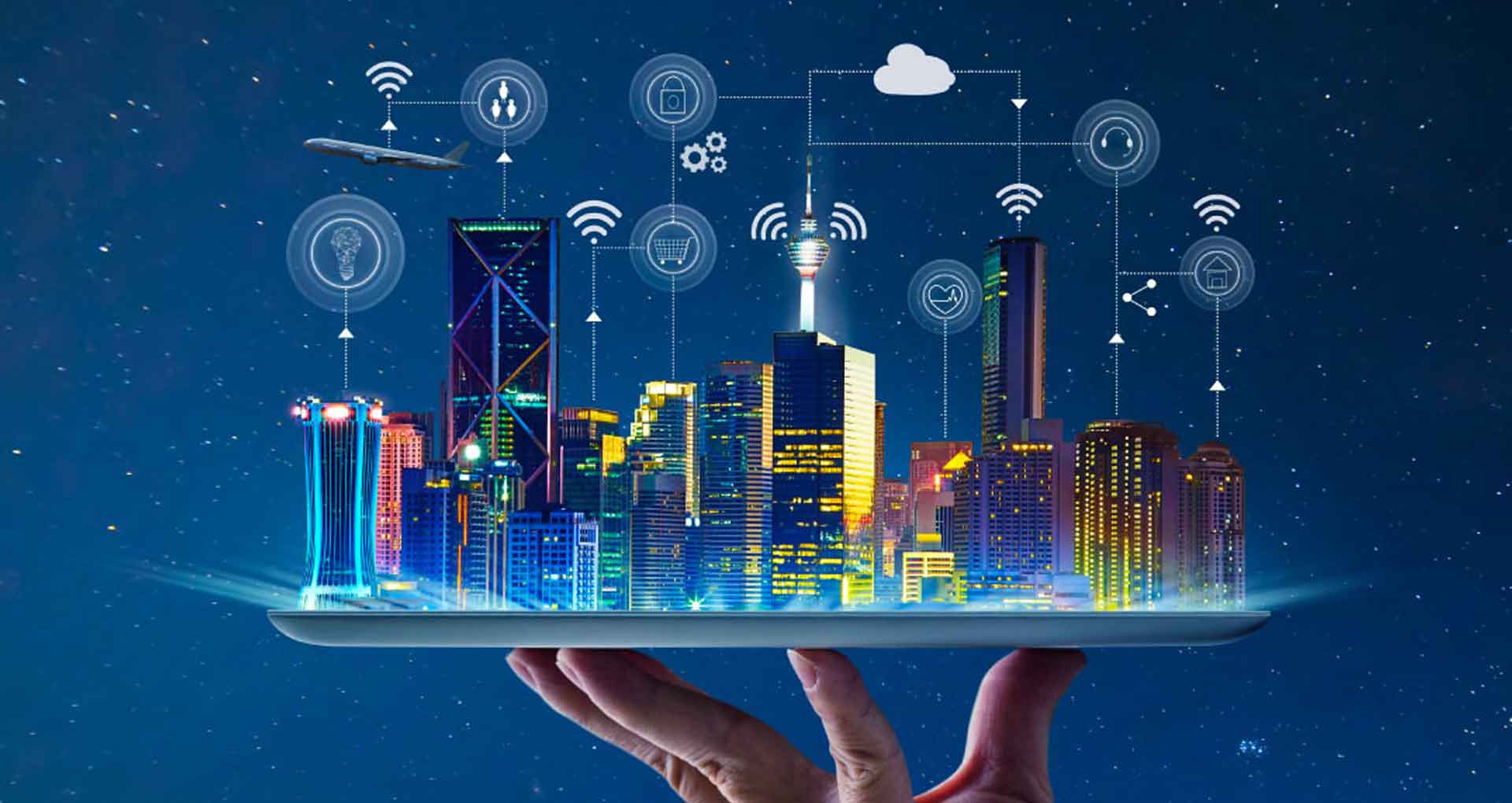If you’ve ever had trouble finding a parking space, you’ll appreciate how an IoT smart parking system can ease customer parking woes. Fortunately, IoT-based smart parking technology makes for a quick and easy solution to parking-related challenges from the ground up! These systems use smart sensors and controllers for swift and seamless parking management in every parking spot.
No wonder the market for IoT parking systems predicts a 22% annual market surge. At this rate, it’s expected to hit $30 billion by 2030![1] Now’s the time to get involved in developing a smart parking system using IoT technology. Explore the step-by-step development process behind this transformative system that is shaping the future of urban living.
Common Issues with the Current Parking Management
For many drivers and car owners, parking often remains the worst element of car ownership. According to the 2023 global driver survey, 92%[2] of global respondents reported difficulties in locating a parking space. Most parking lots are still operated by hand, and although parking management systems aim to make this easier, there are various challenges that come with it. Let’s explore some common issues that make parking a stressful process.
Inefficient Use of Parking Spaces: Manually operated traditional parking lots often leaves many parking spots go unused, which wastes a lot of time and resources for everyone.
Long Search for Vacant Spots: Finding a parking spot in busy areas during peak times takes up too much time and effort, resulting in commuter frustration.
Parking Congestion and Emissions: Searching for vacant spots leads to more fuel usage, higher emissions, and traffic jams.
Rigid Payment Rules: Some cities have strict and inconvenient payment methods for parking facilities.
Vehicle Theft: Security concerns arise due to the risk of theft or damage in urban parking lots.
Overpaying and Fines: Drivers and commuters often end up paying more than what is needed for parking. The long wait can be frustrating for most drivers, and they often end up parking illegally and face penalties by way of parking tickets and meter fines.
What Problems Does an IoT-based Smart Parking System Solve?
Traditional parking systems can often lead to a lack of transparency with respect to availability and pricing, which creates consumer frustration. IoT-based parking management has changed the game for all stakeholders involved. Drivers can now navigate their journeys with parking occupancy insights. Enforcement agencies can swiftly assess violations. Similarly, parking operators can optimize resources with real-time access to parking data. Let’s explore some key issues that IoT-enabled parking systems can efficiently solve:
Problems Addressed by IoT-Based Smart Parking Systems
Enhanced Payment Convenience: Smart meters accept credit card or smartphone payments, thus offering ease of payment. Moreover, IoT sensors constantly detect vehicle presence in the parking facility, updating the app about real-time space availability in the parking facility so the drivers only pay for the time they use.
Congestion Reduction and Traffic Flow Improvement: IoT sensors precisely determine the number and position of vacant parking spaces. They monitor space availability and guide drivers to open spots, thus reducing congestion.
Cloud-Based Dashboard: Parking management technology system utilizes a cloud-based IoT dashboard to deliver real-time insights for a clear facility overview.
Optimized Operations and Enhanced Security: Embedded sensors track vehicle movements for improved parking operations and heightened security. Mobile apps display real-time parking data, sending alerts in case of security breaches.
Environmental Monitoring in Parking Garages: Sensors monitor air quality and temperature to ensure safe conditions for occupants.
Access Control and Management: User authorization on mobile apps or license plate scanning controls entry in parking lots.
Parking Monitoring: Video surveillance integration improves the administration of parking facilities. It makes it easier to address issues like traffic accidents and theft.
Parking Reservation: Drivers can reserve parking spaces through mobile apps or web interfaces aided by innovative solutions like parking locks.
Efficient Parking Management: IoT-based parking system supervises processes, monitors space availability, and also streamlines the billing process for effective parking administration.
Thus, a smart IoT-driven parking system enables drivers to access real-time information while also allowing parking operators to efficiently manage and supervise parking spaces remotely.
Benefits of an IoT-based Smart Parking Management System
An IoT-based smart parking management system transforms parking space for both drivers and facility owners. Listed below are a few of its many benefits it offers:
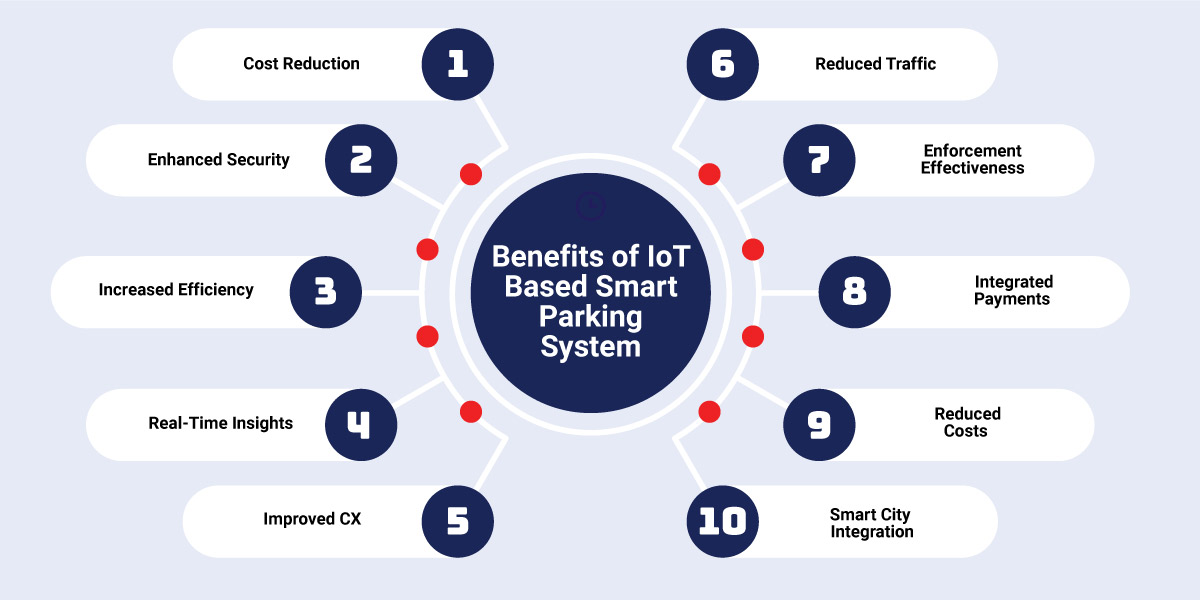
Cost Reduction: Automating payments and ticketing processes, as well as tasks such as detecting vacant spaces minimize operational costs. Predictive maintenance through data from IoT parking sensors can further help reduce maintenance costs.
Enhanced Security: Sensors and integrated surveillance enhance the security and safety of both vehicles by automatically alarming unauthorized access in the parking area.
Increased Efficiency: Drivers benefit from redirected routes to the nearest available spot, which saves their time and fuel cost.
Improved Customer Experience: Real-time information on parking availability and automated payment options ensure superior customer experience.
Real-Time Data and Insights: IoT parking systems provide valuable insights into peak times and parking patterns for effective forecasting and reporting.
Reduced Traffic: Smart parking systems using IoT streamline the parking process and help optimize traffic flow by directing drivers to available spaces. It also helps reduce traffic congestion and time spent searching for parking space.
Reduced Costs and Overhead: Minimizes traditional overheads associated with parking meters and inspectors.
Enforcement Effectiveness: Makes targeted enforcement more effective, directing staff towards vehicles that have overstayed.
Integrated Payments: Incorporates real-time and electronic payment methods, simplifying the parking experience.
Smart City Integration: Essential for Smart City initiatives, aligning with emerging standards like ISO 37122. IoT parking systems assist in ensuring compliance with local regulations.
The integration of IoT technologies with smart parking system thus not only addresses individual challenges but also contributes significantly to creating smarter, safer and more efficient urban mobility environments.
Challenges of Implementing a Smart Parking System Using IoT
The market for smart parking management systems is booming with immense potential. However, the implementation of smart parking technologies is not without challenges. The key hurdles creating obstacles in its widespread adoption include:
Business Challenges
- Awareness and Acceptance: Transforming manually operated traditional parking facility culture to IoT parking system represents a cultural shift. Embracing technology and moving away from long-established practices and parking methods is a monumental task and could be met with resistance. The shift from traditional practices to a tech-driven approach therefore requires time for acceptance.
- High Cost of Implementation: The substantial capital investment needed to build a smart parking infrastructure is another major challenge. Embedding a single parking space with sensors and IoT devices comes at a significant upfront cost, making its widespread adoption financially challenging.
Technical Challenges
- Correctness of Information: Ensuring accurate and real-time information on the application is critical. Inaccuracies or delays can lead drivers to incorrect parking spots, causing confusion on the roads.
- Availability of Standard IoT Tools: Managing parking processes at peak efficiency requires a wide range of technological platforms, IoT technologies and traffic management devices. The challenge lies in integrating the devices from different vendors to connect seamlessly to a single platform.
- Lack of Talent in the Smart Technology Space: Implementing automated parking systems demands professionals well-versed in IoT. The scarcity of skilled talent who can troubleshoot and manage smart solutions poses a significant challenge.
While implementing an IoT-enabled smart parking system presents its own set of challenges, developing an MVP for an IoT smart parking system becomes a critical step in validating the project’s feasibility.
How to Develop an MVP for an IoT Smart Parking System
If you’re considering the development of an IoT-based Smart Parking System, follow these steps to navigate through each of the crucial stages seamlessly:
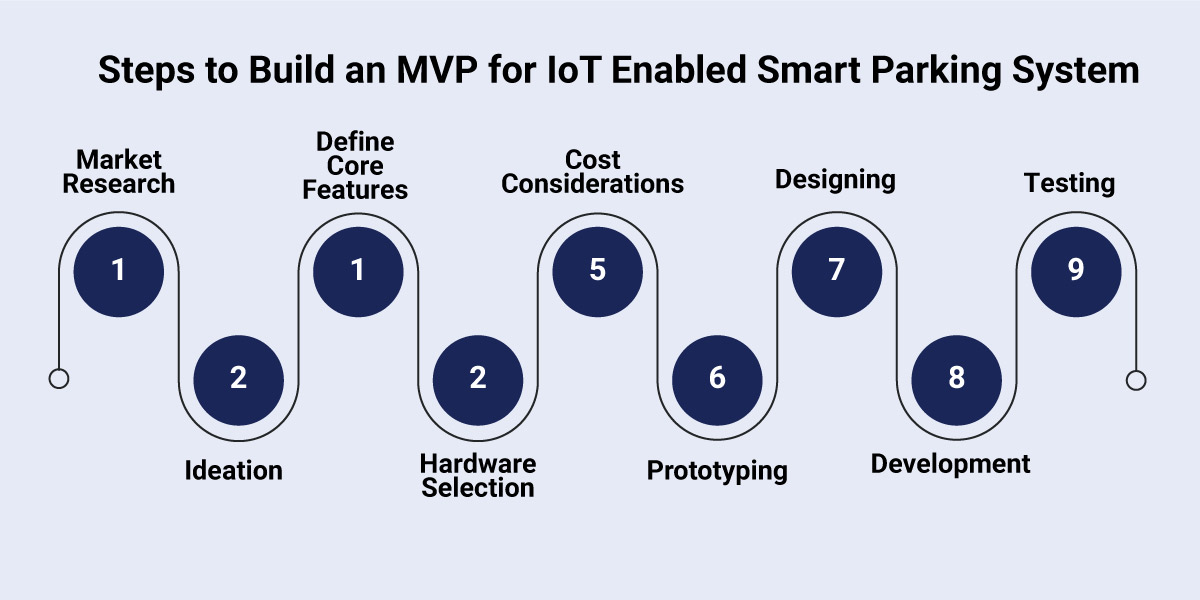
Market Research and Validation: Identify your target market and do thorough research. This will help you validate the concept. Finally gather feedback to ensure that the solution aligns with the primary needs of your target users.
Ideation: Conceptualize your smart parking solution. Decide on appropriate sensors, microcontrollers, cloud services, and network protocols. Determine whether you need to create a mobile app, a web app, or a hybrid solution depending on your business needs.
Define Core Features: Define essential features for the MVP. These can include real-time monitoring, user registration, payment functionality, and an admin dashboard.
Hardware Selection: Choose appropriate IoT hardware components, such as sensors, gateways, and display panels, tailored for parking lots.
Cost Considerations: Plan the budget, covering hardware, software development, operational costs, and equipment expenses.
Prototyping: Construct a workable prototype emphasizing essential features, showcasing the core functionality of the smart parking system. Engage an experienced IoT software development company to build an initial prototype.
Designing: Create a user interface and narrow down on your basic features for the IoT-based PoC (Proof of Concept). Your goal should be to develop a user-friendly app that supports major operating systems.
Development: Mobilize a multi-disciplinary team of mobile, front-end, and back-end developers, along with IoT experts. They’ll implement the technical aspects of your IoT-based smart parking system and integrate it with compatible devices and systems.
Testing: Once all components are interconnected, rigorous testing is required. Conduct comprehensive testing to identify and rectify technical issues, bugs, or usability concerns within the MVP.
Finally, develop a strategy for continuous improvement, gathering customer feedback and providing ongoing maintenance and support. By following this sequence and considering these key points, you can successfully build a robust and efficient IoT-based smart parking system that addresses market needs while ensuring cost-effectiveness and quality.
How Rishabh Software Can Help with the Development of an IoT-Based Car Parking System?
We specialize in developing, implementing, and integrating smart car parking systems using IoT. Our capabilities include:
- IoT Consulting: Leverage our result-oriented IoT consulting services to gain strategic insights specifically tailored to your smart parking project. Our consultants will provide you with comprehensive guidance, ensuring that your chosen IoT technologies are strategically integrated to meet your unique business objectives.
- IoT Integration: Seamlessly integrate IoT technologies into your existing systems with our proven integration process. Our skilled team ensures a smooth fusion of IoT technologies with your current infrastructure for enhanced connectivity and functionality. We optimize and refine your IoT software for superior performance while addressing any existing limitations.
- Full-cycle IoT App Development: Covering the entire lifecycle of IoT initiatives from requirement engineering to architecture design, platform, and app creation, testing, and support, our comprehensive approach ensures a holistic and tailored software solution for your smart parking needs.
- IoT Application Prototype Development: Bring your ideas to life with Rishabh Software’s IoT application prototype development. Our team transforms concepts into tangible prototypes, allowing you to visualize and test the feasibility of your smart parking solutions before full-scale IoT app development.
Our Systematic Smart Parking Software Development Process
- We dive deep into your business needs to gain a clear understanding of your requirements. This allows us to shape an IoT-based smart parking system aligned with your objectives.
- Our PoC demonstrates the feasibility and potential of your smart parking system, giving you confidence in its viability.
- We ensure a seamless transition from conceptualization to a fully functional smart parking system.
- Our team conducts meticulous testing for robustness and provides ongoing support.
- Beyond creating IoT-based smart parking systems, Rishabh Software integrates them with smart home or office solutions too.
- We can also add features like smart lighting to enhance the overall parking experience.
We are always up-to-date with the latest IoT advancements. This gives you the confidence that your IoT smart parking solution integrates the latest technologies for optimal performance.
Frequently Asked Questions
Q: What is an IoT-based smart parking system?
A: An IoT-based smart parking system, or connected parking system, is a centralized management system. It enables drivers to use a smartphone app for parking spot search and reservation. Embedded with sensors, the system detects available parking spots, updating real-time data for drivers to easily find spaces. Users also receive alerts about peak times and prices to save money and reduce congestion.
Q: How does an IoT based car parking system work?
A: The intelligent parking system addresses both street and garage parking challenges. It involves the use of sensors on roads and grounds for tracking customer habits. Cameras are installed to gauge vehicle size and motion while parking meters manage user authorization and payments. A central server relays information and parking management software offers real-time updates. IoT-based mobile apps facilitate transactions and aid users in finding parking spaces.
Q: What are the latest innovations in smart car parking systems?
A: The latest innovations in automatic smart parking management include
- Tracking cars with sensor systems for real-time insights.
- Smart counter systems for detecting entries and exits.
- Automated parking systems for optimizing space efficiency.
- Control systems using IoT for enforcing parking rules.
The future involves revolutionizing parking through real-time monitoring, improved control, space and time optimization in urban areas. It will also help with predicting vehicle flow through comprehensive data analysis.
Q: List real-world examples of smart car parking systems using IoT
A: Here are some examples of how IoT parking system has transformed parking facility experience:
- Huawei’s IoT system for remote booking and fee payment. It offers real-time insights into parking availability and enables automated payments.
- Siemens’ Smart Parking System uses advanced sensors for real-time monitoring and providing occupancy overviews for effective parking management.
- Bosch and Mercedes Benz offer a highly automated Valet Parking system at the Stuttgart Airport that features a connected system for driverless and contactless parking.
Q: Where can IoT based smart parking management systems be effectively deployed?
A: IoT-enabled smart parking systems find effective applications in various settings, including
- Densely populated urban areas
- Parking garages
- Shopping malls
- Airports
- Train stations
- Offices
- Healthcare facilities
- Stadiums for enabling safe and efficient space management.
These systems optimize parking spot usage, reduce congestion, and enhance the overall parking experience by providing real-time info on available spaces.
Footnotes:
1. https://www.securityworldmarket.com/int/News/Business-News/smart-parking-system-market-predicted-for-rapid-growth1
2. https://www.parking-mobility.org/2023/06/20/2023-global-driver-survey-results
